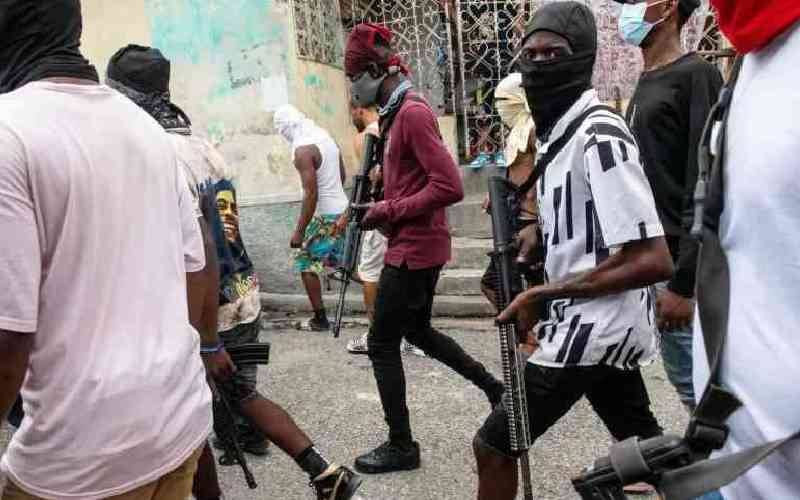The efficiency in which hard-core jihadists were killed in their attempt to attack a military base at the Coast has reinforced the notion that monopoly of violence is vested in our security forces.
It was President Uhuru Kenyatta, following the Kapedo killings, who told a strategic security gathering that legitimate monopoly of violence is by the security services of the police and military forces.
He argued that our police and military forces must be the only actors with the legitimacy to wield violence. They must be ready, willing and able to secure persons and property of all citizens. This is a key dimension of national security. The monopoly of violence also includes the analytical ability to perceive threats, and effective communication to shape perceptions of the state’s deployment of violence.
It is the military and the police services that are both constitutionally and legally empowered to carry and use arms or weapons to protect the ordinary citizens against terrorists, violent criminals, bandits and gather useful intelligence.
Recent security operations indicate the country’s security apparatus, the Cabinet and top legislators are adopting a strategy that allows the security agencies to reclaim their legitimate monopoly on the means of violence.
Both the internal and external security of this nation depend largely on the effectiveness of force and a measure of cooperation between themselves and members of the public. The Mandera massacre was a heinous act that is a pointer to a potent bigger enemy based both outside and within our borders whose tentacles are spreading dangerously to become the biggest security menace this country has ever experienced.
In recent years, Kenya has suffered cross-border acts of terrorism, livestock-rustling and banditry from neighbouring countries, including Uganda, Tanzania, South Sudan and Somalia in which hundreds of innocent lives have been lost.
Terrorist attacks, using lethal and highly destructive weapons such as bombs, grenades and assault rifles, have resulted in the loss of many Kenyans and foreigners, left large numbers of people injured and caused serious damage to property over the past three years.
The main perpetrators of the indiscriminate and cowardly terrorist attacks have been the Al-Shabaab insurgents from long-troubled Somalia, our eastern neighbour, along with their supporters and sympathisers in Kenya.
Similarly, the killing of 42 armed police officers at Baragoi in Samburu County a couple of years ago, the mass murder of hundreds of innocent people at Mpeketoni in Lamu County and the more recent killings of 21 people (19 of them Administration Police officers on travel duty) at Kapedo near the boundary between Baringo and Turkana counties, constitute a serious threat to national security, both internal and external.
Along with the violent acts of mass killings by internal bandits, the constant threat of terrorist attacks by the Somalia-based Al-Shabaab, which has connections with other international groups practising acts of terrorism, such as Al-Qaeda and ISIS, have become a very serious threat to national security and the country’s economic well being.
The national insecurity caused by these violent criminal activities has seriously damaged the usually lucrative tourism industry in Kenya. For several decades now, tourism has been one of the biggest foreign exchange earners for this nation and among the biggest contributors to the GDP.
The Western nations, which provided the largest numbers of tourists to this country, had made a bad situation worse by issuing “travel advisories” that warn their citizens against making tourist or other visits to their favourite destination of the Kenyan Coast.
These highly damaging alerts are issued by some foreign missions even when their own countries are on red alert against terrorism, but without adversely impacting their own economies.
Locally, the easiest pronouncements are to call on the security chiefs to resign. Such pessimistic conclusions regarding the success or failure of the internal security systems and apparatus are both premature and wide of the mark.
Stay informed. Subscribe to our newsletter
In the complex modern criminal world, it has become very difficult to differentiate clearly between internal and external aggression. Terrorists, bandits and other gangs frequently cross international borders and other boundaries to perform their criminal acts in diverse countries, using asymmetrical warfare, massacres, mass kidnappings and even reviving high seas piracy, a crime that had disappeared for centuries.
Legitimate defenders of national defence and security must overwhelmingly reclaim the monopoly of legal force.
 The Standard Group Plc is a
multi-media organization with investments in media platforms spanning newspaper
print operations, television, radio broadcasting, digital and online services. The
Standard Group is recognized as a leading multi-media house in Kenya with a key
influence in matters of national and international interest.
The Standard Group Plc is a
multi-media organization with investments in media platforms spanning newspaper
print operations, television, radio broadcasting, digital and online services. The
Standard Group is recognized as a leading multi-media house in Kenya with a key
influence in matters of national and international interest.
 The Standard Group Plc is a
multi-media organization with investments in media platforms spanning newspaper
print operations, television, radio broadcasting, digital and online services. The
Standard Group is recognized as a leading multi-media house in Kenya with a key
influence in matters of national and international interest.
The Standard Group Plc is a
multi-media organization with investments in media platforms spanning newspaper
print operations, television, radio broadcasting, digital and online services. The
Standard Group is recognized as a leading multi-media house in Kenya with a key
influence in matters of national and international interest.









